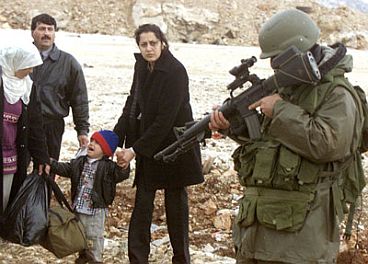
By Amira Hass, Haaretz
Anyone who wants to become acquainted with Israeli society should go to the checkpoints. Not for a quarter of an hour, under the guidance of commanders who will glory in the pavilion they built for the people waiting in line and will explain that the upgrading and the expansion of the checkpoint are intended to benefit the locals. Those who really want to know the checkpoints should rather dwell here for hours, during several days. When you observe the soldiers, you will discover many Israeli characteristics among them, characteristics in which we have always taken pride.
Comradeship, for example. The comradeship is so strong that there are those who feel they can even deviate from the norms that have been created at the checkpoint, which are perverted in any case. At the Taysir checkpoint, for example, in two cases documented during the past two weeks, a soldier urinated in public, and in the presence of women. Perhaps it was the same soldier both times, or perhaps two different soldiers. This was but an extreme manifestation of the scorn the soldiers at the checkpoint demonstrate for the people who are at their mercy and must pass through there – teachers, farmers, merchants, schoolchildren, workers at the settlements. But this is also an expression of the soldiers’ self-confidence, of the knowledge that none of their comrades will prevent them from doing things they would not do in Binyamina or Bnei Brak.
The willingness to help is also an Israeli trait. The very same soldier helped a policeman ensconced in his jeep at this remote checkpoint, located at the end of the Jordan Valley. On Tuesday last week, this soldier collected the identity cards of a number of drivers, gave them to the policeman in the jeep and returned to the drivers with the ID cards and with traffic violation tickets and a payment of a fine of NIS 100 each, which they would have to pay for the benefit of the state treasury, for not wearing seat belts. And incidentally, they were wearing seat belts, although their cars had already been waiting for half an hour or more.
Inventiveness is another blessed Israeli trait. A military order prohibits all Palestinians from entering and sojourning in the Jordan Valley, except for those who live there and work for the most part at Jewish settlements. In recent weeks, the soldiers at the Taysir checkpoint have told inhabitants of the Jordan Valley who “dared” to spend the night outside the valley and return to it in the morning that “this is forbidden.” A year and a half ago they decided that it was “forbidden” for farmers to bring their produce through this checkpoint – as a result, these farmers had to make a detour of about 30 kilometers and pass through a different checkpoint. When it was made clear to the soldiers that there was no such order, they found a method to keep drivers away from the checkpoint: They obligated those who transport vegetables into the West Bank to unload all crates before the checkpoint, supposedly for inspection, and to reload them.
Tenacity is also considered to be an admirable trait, especially in the army. Brigade commanders come and go, soldiers are replaced and yet, during the past two years, the reports about the distant Taysir checkpoint have remained the same: soldiers who invent harassments, waiting times way beyond what is justified, on various false excuses (one time it is construction work at the checkpoint, another time forged documents and yet another time a security warning), and reports of people who were made to pass through a different checkpoint.
It is easy to claim that Taysir is exceptional. It is a fact that the reported behavior of that particular soldier was seen by his commanders as very grave, and he was suspended from his position. The brigade also denied the veracity of reports by inhabitants that the specific soldier was present and “served” at the checkpoint even after he was suspended for about two hours on one day and three hours on another. Brigade officials stressed that the suspension of this soldier is still in force, with the same assertiveness as those people who said they had seen him again at the checkpoint. In any case, in the past, too, after this kind of information was brought to the attention of the commanders, the situation at the checkpoint improved for several days and the waiting time was shorter, and then everything returned to the status quo ante. Each of the many dozens of checkpoints has developed its own methods of harassment over the years. They derive from the implicit order behind the existence of every checkpoint: Prevent Palestinian freedom of movement for the sake of the welfare of the Jewish settlements; that is to say – Israel. One gets sick of reading about the checkpoints. One gets even sicker of writing about them. And the most sickening thing of all is to pass through them. But because the Palestinians have no alternative but to continue to pass through them, these checkpoints will continue to be the representatives of Israeli society.

A European Civilian
How long must my heart endure these images ?
How long will persuasion to shame knock on my door ?
How long will it take us to meet the Light ?
Will it be in time for me and them?
Will I feel relieve then ?
Will I not have become flooded by guilt or apathy then ?
For they have travelled so long
In that space with many byways
On that invisible road,
Where none have seen its end,
I pray for wisdom and hope
and intervention to begin the mend